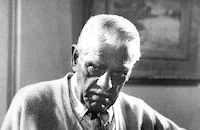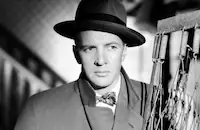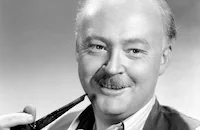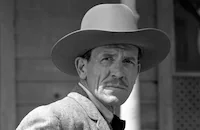Before I Hang
Brief Synopsis
Cast & Crew
Nick Grinde
Boris Karloff
Evelyn Keyes
Bruce Bennett
Edward Van Sloan
Ben Taggart
Film Details
Technical Specs

Synopsis
Dr. John Garth, a noted scientist who is convinced that life cells are immortal and old age a disease, is on the verge of perfecting a serum that would defeat senility when he is condemned to hang for a mercy killing. In the prison laboratory, Garth feverishly works against time to perfect his serum. With less than a half hour to live, Garth persuades Dr. Ralph Howard, the prison physician, to inoculate him with the serum. Ironically, at the last minute, his sentence is miraculously commuted to life imprisonment, and Garth awakens from the effects of the serum to discover that he has conquered age and faces endless years in prison. The serum, however, has a more insidious effect on Garth, because the blood in the inoculation contained the cells of a confirmed killer, and soon the murder poison comes to dominate him, turning him into an involuntary killer. His first victims are Dr. Howard and a prison trusty, but because there were no witnesses, Garth is not suspected of the crime, and soon after, he is freed from prison for his noble experiments. After returning home to his daughter Martha, Garth invites several of his old friends to visit. He insists on inoculating them with his serum, and when they refuse, the scientist murders them one by one. When clues in the first murder point toward the doctor, Captain McGraw of the police department begins to watch the Garth house. Martha's fiancé, Dr. Paul Ames, also notices the doctor's suspicious behavior and warns her to leave the house. After nearly strangling his own daughter, Garth returns to prison to give himself up, but when he loses control and tries to strangle a guard, the guard shoots him, bringing Garth's tormented double life to an end.

Director
Nick Grinde
Cast

Boris Karloff

Evelyn Keyes

Bruce Bennett

Edward Van Sloan
Ben Taggart
Pedro De Cordoba
Wright Kramer
Bertram Marburgh

Don Beddoe
Robert Fiske

Kenneth Macdonald
Frank Richards
John Tyrrell
Eddie Laughton
Stanley Brown
Frederick Burton
Ernie Adams
Richard Fiske
Edward Earle
James T. Mack
Charles Trowbridge
Gohr Van Vleck

George Mckay
Jack Cheatham
Crew
Robert D. Andrews
Robert D. Andrews
Lionel Banks
Irving Briskin
Karl Brown
Milton Carter
Benjamin Kline
Wallace Macdonald
Charles Nelson
M. W. Stoloff
J. S. Westmoreland

Videos
Movie Clip


Film Details
Technical Specs

Articles
Before I Hang
This time out, Karloff plays John Garth, an elderly clinician focusing his autumn years on finding a cure for the infirmities of aging. Convicted of the mercy killing of a terminally ill patient, Garth is sentenced to death but allowed to continue his experiments while awaiting his appointment with the electric chair. As the hour of his death approaches, Garth injects himself with a serum derived from the blood of an executed murderer... but within minutes learns that his death sentence has been commuted to imprisonment for life. Garth's joy in being able to perfect his cure is tempered more than somewhat when he is wracked by homicidal urges and begins killing the very people he had hoped to cure. Because Before I Hang was produced by Wallace MacDonald for Columbia's busy "B-hive," the film's supporting cast is strictly second string (and includes former movie Tarzan Bruce Bennett, as the film's nominal hero). Nevertheless, it is fun to see Karloff put back in the frame with his Frankenstein costar Edward Van Sloan. As the use of an abnormal brain had been the catalyst for calamity in Frankenstein, so tainted blood is the bogey here and Karloff gets to kill Van Sloan as he had eight years earlier, throttling the life out of him in a dimly lit laboratory. Overfamiliar, perhaps, but Before I Hang compensates with a visually impressive marriage of Lionel Banks' art direction and the shadowy cinematography of Benjamin Kline, who later shot nearly half the episodes of the Boris Karloff-hosted NBC anthology TV series Thriller.
The original story and screenplay for Before I Hang were contributed by Karl Brown and Robert Hardy Andrews respectively. Brown had arrived at the job of studio scribe via the circuitous route of work as a still photographer and later a camera operator for D. W. Griffith on The Birth of a Nation (1915), Intolerance (1916) and Broken Blossoms (1919). Brown's later career as a cinematographer in his own right spanned the last ten years of the silent era, after which he directed a dozen pictures, the last in 1938. Brown wrote both The Man They Could Not Hang and The Man with Nine Lives and penned scenarios for Before I Hang and Republic's The Ape Man (1943), also starring Boris Karloff.
Robert Hardy Andrews (born Charles Robert Douglas Hardy Andrews) started out as a reporter for (and later the editor of) The Minneapolis Journal and The Chicago Daily News. Andrews also worked as a producer in radio, where he created Jack Armstrong: The All-American Boy, about a globe-trotting high school adventurer. (The radio show spawned a 1947 movie serial but a bid by Hanna-Barbera to turn the property into an animated series in the early Sixties was stonewalled by rights litigation, leading to the creation of Jonny Quest.) Although he wrote more than his fair share of westerns, Andrews brought his extensive knowledge of world travel to such films as Bataan (1943), Bagdad (1949) and Tarzan Goes to India (1962), and also write teleplays for Thriller.
Karloff's next assignment for Columbia was The Devil Commands (1941), an adaptation by Robert Hardy Andrews and Milton Gunzburg of William Sloane's 1939 novel The Edge of Running Water, about an electrophysicist's mania to communicate with his dead wife. Assigned direction of the picture was Edward Dmytryk, prior to his HUAC troubles and breakthrough hit Crossfire (1947), but otherwise it was the same familiar formula for Boris Karloff. Happily, he was soon invited to New York for a three-year run in the Broadway production of Arsenic and Old Lace, with which he also toured the South Pacific to entertain American troops. Karloff took a leave of absence from the play (at which time he was subbed by Eric von Stroheim) to finish his Columbia contract with The Boogie Man Will Get You (1942). Karloff was yet another mad scientist here (aided and abetted by Peter Lorre) and brought an equal proportion of paint-by-number psychopathy to Universal's The Climax (a thinly-veiled remake of The Phantom of the Opera) and House of Frankenstein (both 1944) before his justly lauded work at RKO with producer Val Lewton, beginning with The Body Snatcher (1945). Although they made only three films together (with Isle of the Dead [1945] and Bedlam [1946] rounding out the triptych), the low budget/high impact Karloff-Lewton axis was the last hurrah of classic horror in Hollywood and remains Karloff's finest work in the genre.
Producer: Wallace MacDonald (uncredited)
Director: Nick Grinde
Screenplay: Robert D. Andrews (story and screenplay); Karl Brown (story)
Cinematography: Benjamin Kline
Art Direction: Lionel Banks
Film Editing: Charles Nelson
Cast: Boris Karloff (Dr. John Garth), Evelyn Keyes (Martha Garth), Bruce Bennett (Dr. Paul Ames), Edward Van Sloan (Dr. Ralph Howard), Ben Taggart (Warden Thompson), Pedro de Cordoba (Victor Sondini), Wright Kramer (George Wharton), Bertram Marburgh (Stephen Barclay), Don Beddoe (Capt. McGraw), Robert Fiske (District Attorney).
BW-62m. Closed Captioning.
by Richard Harland Smith
Sources:
The Films of Boris Karloff by Richard Bojarski and Kenneth Beals
Karloff: The Man, The Monster, The Movies by Denis Gifford
Boris Karloff: The Man Remembered by Gordon B. Shriver
Karloff: The Life of Boris Karloff by Peter Underwood
Heroes of the Horrors by Calvin Thomas Beck
The Horror People by John Brosnan
Golden Horrors: An Illustrated Critical Filmography, 1931-1939 by Bryan Senn
Raised on Radio by Gerald Nachman

Before I Hang
Quotes
Trivia
Notes
The working title of this picture was The Wizard of Death.














